INDEPENDENCE OF CONGO
Dipanda! Dipanda! Dipanda!
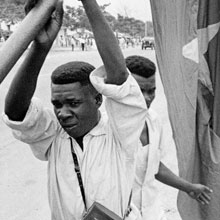 |
Major events in the history of Congo's independence Proclaimed on 30 June 1960, the independence of Congo was the fundamental step of a long process that exerted profound and far-reaching effects and gradually... |
Desire for independence
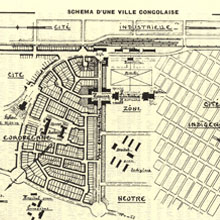 |
The 'colour bar'The colonial system is one of legal inequalities between colonizers and colonized, based on 'racial' differentiation. Unlike the Belgian Constitution, its equivalent in the colony, the Colonial... |
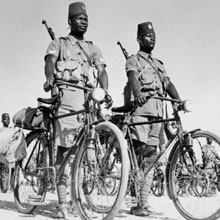 |
The war effortDuring the Second World War, Congolese soldiers of the Force Publique's Expeditionary Force are sent to fight side-by-side with European soldiers in Burma, Egypt, Ethiopia, Madagascar and... |
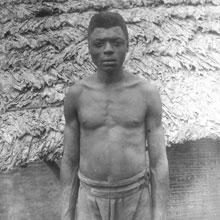 |
ResistanceFrom the interwar period to the eve of Congo's independence, the colonial system meets with resistance. During all this time, the memory of the regime of King Leopold II and the violence associated... |
A model colony?
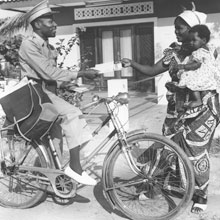 |
A new modern cultureThe colonial administration and Christian churches sometimes find it difficult to establish their authority; some groups resist more than others. However, by 1950, much of the population... |
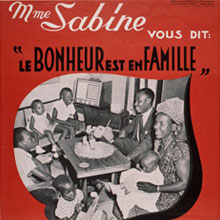 |
The 'évolués'The word 'évolué' is a poorly defined term that applies to Congolese deemed 'civilized'. Some say that on the eve of independence only 1% of the population claims to be 'évolué'. Indeed... |
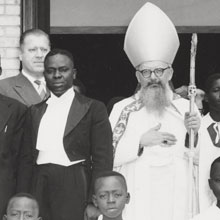 |
A 'model colony'After the Second World War, the Ten Year Plan (Plan décennal pour le développement économique et social du Congo belge), published in June 1949, emphasizes the colony's... |
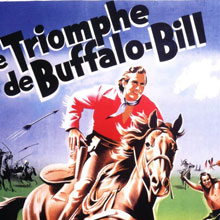 |
The 'Bills'In Leopoldville's 'indigenous' township, some youths aspire to modernity without wanting or being able to become 'évolués'. They develop a counterculture, subversive and marginal... |
Towards independence
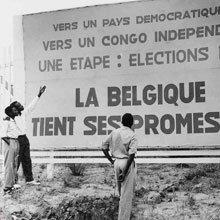 |
The first electionsBeginning in 1956, the political pace quickens. Originally written in Dutch, Jef van Bilsen's Plan de trente ans pour l'émancipation de l'Afrique belge ('Thirty Year Plan for the Emancipation... |
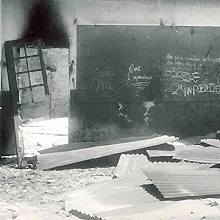 |
The riots of 4 January 1959On 4 January 1959, riots rock Leopoldville when the colonial government suddenly forbids a meeting of ABAKO, led by Joseph Kasavubu. The same day, a nearby football match... |
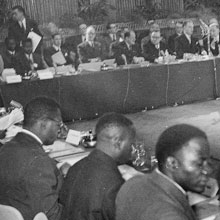 |
Round TableThe first Round Table leads rapidly to agreement in principle on Congo's immediate independence, which is scheduled for 30 June. What independence means exactly... |
30 June 1960
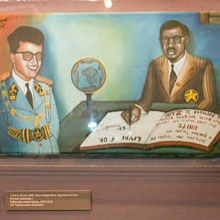 |
IndependenceBest wishes to the new Congolese state! Patrice Lumumba, victorious in the May elections, is appointed to form a coalition government on 21 June. On 24 June, he wins the confidence... |
The Congo Crisis
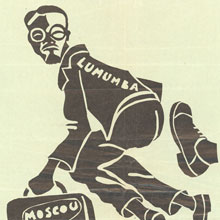 |
The Congo CrisisThe mutiny of the Force Publique. On 4 July 1960, Force Publique soldiers in Camp Leopold, in the capital, and Thysville sign a petition demanding the africanization... |
The Mobutu years
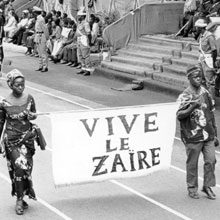 |
The Mobutu yearsThe call for authenticity and Zaireanization. Congo is politically independent. Now Mobutu wants cultural and economic independence. The call for authenticity marks the break... |
The Congolese 'cake'
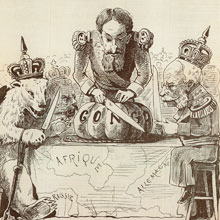 |
The Congolese 'cake'Since 1884, when the Berlin Conference granted Leopold II control of the country, the great powers have vied for Congo's immense natural resources. In 1960, Belgium grants... |
Boula Matari
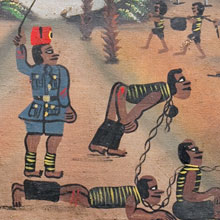 |
Boula MatariThe Kikongo Boula Matari or Boula Matadi is the name today's Congolese have given to the state. Literally, it means 'stone crusher' – in other words, 'he who goes through everything... |
The 2006 elections
 |
The 2006 electionsIn 1999, despite a ceasefire agreement, fighting continues in the DRC. The UN sends peacekeepers (MONUC) to enforce the accord, but the Congolese population protests... |
Lola's dream
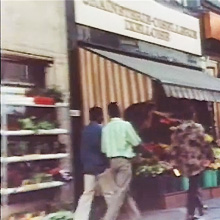 |
Lola's dream'Poto', 'Lola', 'Miguel': the Congolese use different names when they talk about Europe in general and Belgium in particular. In Congo, as in Belgium, relations between... |


